(A) STUDIO SESSIONS
In the beginning of 1957 one more season in Los Angeles, this time with a memorable ensemble. Eighteen tracks were recorded in five session dates. A curiosity is the stereo sound in some of the tracks for the first time in her recording history. All the tracks deserved at least three stars. This is an unforgettable season, in my humble opinion maybe the greatest of them all. To regret it would be the last produced by Norman Granz.
Session #79 Los Angeles 03/January/1957 Billie Holiday & Her Orchestra
(CD: The Complete BH on Verve vol. 8 tk 19-21)
Harry ‘Sweets’ Edison (tp) Ben Webster (ts) Jimmy Rowles (p) Barney Kessel (g) Red Mitchell (b) Alvin Stoller (d) Billie Holiday (v)
Tracks MT 289, 290 and 291
Session #80 Los Angeles 04/January/1957 Billie Holiday & Her Orchestra (CD: The Complete BH on Verve vol. 8 tk 22, 25 & 30)
Harry `Sweets` Edison (tp) Ben Webster (ts) Jimmy Rowles (p) Barney Kessel (g) Red Mitchell (b) Alvin Stoller (d) Billie Holiday (v)
Tracks MT 292, 293 and 294
Session #81 Los Angeles 07/January/1957 Billie Holiday & Her Orchestra (CD: The Complete BH on Verve vol. 9 tk 1-4)
Harry `Sweets` Edison (tp) Ben Webster (ts) Jimmy Rowles (p) Barney Kessel (g) Red Mitchell (b) Alvin Stoller (d) Billie Holiday (v)
Tracks MT 295, 296, 297 and 298
Session #82 Los Angeles 08/January/1957 Billie Holiday & Her Orchestra (CD: The Complete BH on Verve vol. 9 tk 9, 11, 13 & 16)
Harry `Sweets` Edison (tp) Ben Webster (ts) Jimmy Rowles (p) Barney Kessel (g) Red Mitchell (b) Alvin Stoller (d) Billie Holiday (v)
Tracks MT 299, 300, 301, 302
Session #83 Los Angeles 09/January/1957 Billie Holiday & Her Orchestra (CD: The Complete BH on Verve vol. 9 tk 17-20)
Harry ‘Sweets’ Edison (tp) Ben Webster (ts) Jimmy Rowles (p) Barney Kessel (g) Red Mitchell (b) Larry Bunker (d) Billie Holiday (v)
Tracks 303, 304, 305, 306
Three LPs contain all 18 songs: All or Nothing at All, Body and Soul and Songs for Distingué Lovers. However, the order they choose to print do not match my sequence, that was based in the Verve CD collection. Therefore, I will present the tracks in the order they are in the LPs just to make it easier for you to locate and hear them if you want.
(MT 289) I Wished On The Moon *** this is the third studio recording of this song, the last one being in 1955 (see MT #252), also excellent. Edison does the obbligati and Webster opening in the bridge is thrilling; Edison accompany him in a muted instrument. In the final chorus, the obbligati are by Kessel and Webster. The rhythm is contagious.
(MT 297) But Not For Me *** a composition by Gershwin for the Girl Crazy musical in 1930. This turn Rowles does the intro backed by Kessel. In the bridge, Rowles keeps the swing followed by Webster and the others. In the final chorus, Edison and Webster alternate their obbligati.
These songs are in All or Nothing at All – tracks 5 and 6 in side A. Click here to listen.(temporarily unavailable)
(MT 300) Say It Isn’t So *** in my opinion, this is a much better version than the Shaver’s recording in 1955 (see MT #250). Rowles opens and backs Billie in a long slow solo. The band comes in with an excellent obbligato by Edison. A beautiful Berlin’s composition.
(MT 301) Our Love Is Here To Stay *** another Gershwin’s classic. A long and pleasant Webster’s intro precedes Billie’s first chorus backed by Edison and Kessel. The bridge is unusual, with a duet Rowles & Kessel.
These songs are in All or Nothing at All – tracks 5 and 6 in side B.
(MT 298) Body And Soul ***1/2 an excellent remake of this classic by John Green, quite superior from the 1940 version (see MT #130), where Roy Eldridge played: a good opportunity to compare those two geniuses. Kessel does a classic opening and backs Billie in the sequence, in counterpoint with Rowles. This is another of my favorite songs, that’s why the half-star bonus. Webster opens in high style the bridge, in an one-minute solo. Edison does a break and Webster closes the two-minute bridge. A total of 6’22″ of pleasure.
(MT 303) They Can’t Take That Away From Me ***1/2 after 20 years Billie remakes this Gershwins classic (see MT #54). At least, a good opportunity to compare both versions and realize that an eternity has gone. Kessel does a short intro and follows in obbligati. The cadence is quite jazziest, notice Mitchell and Bunker in the rhythm section. Edison opens the bridge in mute keeping the balance and Webster complement in the same way. They both back Billie in the final chorus. Once more I point out the work of Mitchell & Bunker; they deserved the half-star.
(MT 296) Darn That Dream *** a slow-tempo track bringing us a classic by Jimmy Van Heusen, lyrics by Eddie DeLange. Kessel solos in a brief intro and Billie comes in backed by Webster and Kessel oblligati. The long bridge is opened by Edison and the innovation here is Red Mitchell’s guitar solo. Webster closes the bridge and Billie comes for the coda backed by Edison and Kessel. Wow!
(MT 305) Let’s Call The Whole Thing Off *** this track also resumes the theme from 20 years ago (see MT #53). At that time I commented that this song by the Gershwins was not among my favorites and actually is not. But, how to resist a bridge with Webster and Edison solos? And the rhythm section swing?
The four songs are in Body and Soul – full side A.
(MT 294) Comes Love ***1/2 The opening is quite original, with Kessel solos punctuated by Stoller. Billie comes in with Edison’s obbligati. He has an open instrument in this track and opens the bridge in high style matching perfectly the swung spirit of the song. Kessel and Webster close with shine. This song is by the less-known Lew Brown & Sam Stept & Charles Tobias and the initial verses are funny: “Comes a rain storm, put your rubbers on your feet/ Comes a snow storm, you can get a little heat/ Comes love, nothing can be done”. Do you agree? Then, half-star as bonus.
(MT 294a) Comes Love (alternate take)
(MT 306) Gee Baby, Ain’t I Good To You? *** as to break the sequences of ‘oldies’ this minor composition by Don Redman & Andy Razaf is new in Billie’s repertory. The tempo is slow and the bridge is opened by Webster and Edison sequence is a wonderful solo. We could answer the song title with an “Yes Baby, you were good to us…”
(MT 304) Embraceable You ***1/2 another remake, this turn from 1944, Commodore times (see MT #167). Another world, isn’t it? The tempo is slow. Edison and Webster do an excellent job in the obbligati. Rowles opens the bridge with a wonderful solo and Kessel gives a proper sequence. Webster closes the bridge with an anthological solo – more than two minutes – and Edison closes the long bridge. Billie comes back for the final chorus. The song is by the Gershwin brothers and I am excused to say it is an all-time classic. Almost seven-minute long (together with Day In Day Out and I Wished On The Moon, the longest track in studio). The half-star goes to Webster.
(MT 290) Moonlight In Vermont *** beautiful melody by Karl Suessdorf composed in 1944 that Billie records for the first time. Kessel does a solo opening and the obbligati are by Rowles. The cadence is slow and Webster assumes the bridge backed by Rowles who, in turn, performs the obbligati in the final chorus.
The four songs are in Body and Soul – full side B.
(MT 295) Day In Day Out ***1/2 [stereo] a classic composition by Rube Bloom, lyrics by Johnny Mercer. Rowles does a brief intro solo and backs Billie in obbligati in the sequence, alternating with Kessel. The cadence is very jazziest and Edison opens the bridge with his muted trumpet, then the others come in sequence while Webster closes. This is a 3’20s bridge, almost a jam session! A deserved half-star for it! We can figure out Billie wiggling her head and giving the opportunity for the band to improvise. This is a characteristic that she, more than any other, cultivated along her carrier. She comes back for the final chorus, backed by Edison and Webster. A total of 6´47″ of enjoyment.
(MT 291) A Foggy Day *** [stereo] (this is her first stereo recording) a classic by George & Ira Gershwin in her first rendering. Billie opens the introduction backed by Rowles in a slow tempo and then the band follows the rhythm together with the lyrics. The bridge follows the cadence with solos by Rowles, Kessel, Edison and Webster. Wonderful. Billie comes back for the coda, with the full band.
(MT 299) Stars Fell On Alabama **** [stereo] an standard by Frank Perkins, lyrics by Mitchell Parish – one of my favorites. Edison does the intro with open trumpet and Billie assumes backed by Rowles in obbligato. A swung and contagious cadence. Edison is back in the bridge, this time muted, and Webster follows with perfection. In the final chorus, Billie is backed by Edison and Kessel. As a curiosity, Ella Fitzgerald had recorded the same song a couple of months before, in August 16th, 1956 – but Billie’s version is superior. I wrongly typed four stars, but immediately I decided not to change; a bonus for the the stereo sound…
The three songs are in Songs For Distingué Lovers, full side A.
(MT 302) One For My Baby And One More For The Road **** [stereo] A fantastic composition, this classic song by Harold Arlen, lyrics by Johnny Mercer. Also stands in my favorite list. The arrangement is also unusual, because in the 5’39″ there’s no bridge. To compensate, the obbligati by Edison and Webster are anthological. I couldn’t resist a fourth star bonus.
- Frank Sinatra will record this song with Nelson Riddle short after, in June 1958. He declared many times being Billie one of his greatest influences; maybe he was inspired by this recording? On the other hand, is it possible that Billie’s preference by string orchestras could also be influenced by Sinatra, among others, who knows? In fact, this would be her choice after leaving Verve. Unfortunately. See also note by Joe Styles’s in the reader’s comments below.
(MT 293) Just One Of Those Things *** [stereo] one of my favorite songs, by Cole Porter, first Billie recording. The opening is an artwork, the bridge is memorable with Rowles opening and the others in sequence. Five minutes and 31 seconds of pure delight.
(MT 292) I Didn’t Know What Time It Was ***1/2 [stereo] Billie does the introduction backed by Rowles and opens the lyrics with a pleasant obbligato by Webster. Edison opens the bridge in a perfect chorus, Kessel doesn’t stay behind and Webster closes. Billie comes for the final chorus with obbligati by Edison. Delicious. Music by Richard Rodgers, lyrics by Lorenz Hart, stereo sound: what else one could ask? A half star plus.
The three songs are in Songs For Distingué Lovers, full side B.
If that was the end of studio sessions with Norman Granz, there will be a last live presentation with him in July, 1957 at the Newport Jazz festival. If this was the last time with Granz, was the first with pianist Mal Waldron, who would accompany her till the end. He recorded 52 tracks with Billie, most of them in live sessions, being only six in studio.
Repeating what happened when the contract with Columbia ended at the beginning of the 40’s, the lack of a formal compromise – and maybe a strong producer – let Billie reaffirm her passion for pop music and elaborate orchestral arrangements. She might consider it elegant, but in my opinion – that I share with many other fans – it doesn’t bring the best of her. Nevertheless, Billie would record two albums, one for Columbia and a second for MGM, both in New York.
(B) LIVE SESSIONS
Live Session #53 [live recording] Chicago, 11/March/1957 Mister Kelly’s Nightclub (CD Billie Holiday Banned From NYC vol.2)
Paul Quinichette (ts) Carl Mark (p) Sam Saffini (b) Dominic Mickey Simonetta (d) Billie Holiday (v)
- An historic Chicago night point at Rush Street till 1975, Mr. Kelly was founded in 1953, named after his manager Pat Kelly. This session has been live recorded.
(LR 178) Good Morning Heartache *
(LR 179) You Better Go Now *
Tracks unissued in vinyl.
Live Session #54 [live recording] Newport, RI 6/July/1957 Newport Jazz Festival (CD: Perfect Complete Collection vol.11 or Complete BH on Verve vol.10 or CD Jazz At The Philharmonic (the two latter contain also the four intro tracks).
Mal Waldron (p) Joe Benjamin (b) Jo Jones (d) Billie Holiday (v)
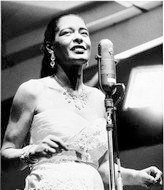 This session is memorable. Professionally recorded in the Newport Jazz Festival in the Freebody Park Rhode Island it was issued in a Clef LP in the same year (see LP discography). On LP’s A side, six tracks by Ella Fitzgerald, recorded in a previous date in Newport. Sound quality is excellent, but Billie’s voice is harsh and crackling. Nevertheless, something to be remembered. The set starts end ends with Mal Waldron at a fanfare from Oh, Lady Be Good.
This session is memorable. Professionally recorded in the Newport Jazz Festival in the Freebody Park Rhode Island it was issued in a Clef LP in the same year (see LP discography). On LP’s A side, six tracks by Ella Fitzgerald, recorded in a previous date in Newport. Sound quality is excellent, but Billie’s voice is harsh and crackling. Nevertheless, something to be remembered. The set starts end ends with Mal Waldron at a fanfare from Oh, Lady Be Good.
(LR 180) Nice Work If You Can Get It * three announcements precede that track: Willis Conover introduces Johnny Mercer that on his turn announces Billie (curiously, none of the songs is Mercer composition)
(LR 181) Willow Weep For Me *
(LR 182) My Man ** the two latter tracks in a slow tempo.
(LR 183) Lover Come Back To Me * here, the swung tempo wakes up the audience.
(LR 184) Lady Sings The Blues * Billie introduces the track: “a song that I recorded for Norman Granz at Clef”. (Hear it at Studio Songs section). A beautiful melody, in a somewhat slow tempo.
(LR 185) What A Little Moonlight Can Do I don’t like this song. At the end, Billie slows it down and jokes with Mal Waldron its characteristic accords.
Original LP Verve MGV 8234 B BH At Newport (US 1958).
Live Session #55 [live recording] Stratford, Canada 10/August/1957 Stratford Festival (CD Billie Holiday at Stratford ’57)
Mal Waldron (p), Ernie Cosachuck (b), Archie Alleyne (d) Billie Holiday (v)
- The Stratford Shakespearean Festival of Canada had, in its first years, presented some extra attractions, like jazz musicians, in order to attract the public. So, on August 9 and 10 Billie shared the shows with the Collier Quintet, a Toronto-based group. Only the second concert has been recorded.
(LR 186) Nice Work If You Can Get It – Billie is out of microphone, specially in the first tracks, resulting in a poor recording quality.
(LR 187) Willow Weep For Me
(LR 188) I Only Have Eyes For You
(LR 189) Billie’s Blues * three classics in a row, starting with this gem. Sound got better.
(LR 190) Lover Come Back To Me * in a fast tempo, Billie’s voice is harsher than ever. The rhythm section, from the Collier Quintet, hold a nice swing. A curiosity can be listened at the interval, with Waldron in a fanfare from “Oh Lady Be Good”, song composed by the Gershwins in 1924 that Billie never recorded – similar of what he did in the previous session (see session #54)
(LR 191) Lady Sings The Blues * in the sequence, Billie introduces herself this tune and Waldron opens with creativity. The track ends with a fanfare and the audience applause.
Tracks unissued in vinyl.
Live Session #55A [radio broadcast] New York, 22/September/1957 Percy Faith And the Woolworth Orchestra (CD: Perfect Complete Collection vol.11)
Unknown Band, Billie Holiday (v)
- Percy Faith was a popular arranger and conductor. From 1955 to 1957 he worked as musical director for the CBS show “Woolworth Jazz Hour”, where this radio broadcast took place. This is the only session she ever did with Faith. Count Basie was also in the show.
(LR 191A) You Better Go Now *
(LR 191B) Them There Eyes
Original LP Giants of Jazz GOJ 1018 The Winners (US 1979). Sound not available.
Live Session #56 [live recording] New York 5/December/1957 (CD Perfect Complete Collection vol.11)
Mal Waldron All Stars Doc Cheatham (tp) Vic Dickenson (tb) Lester Young, Ben Webster, Coleman Hawkins (ts) Mal Waldron (p), Danny Barker (g) Jim Atlas (b), Jo Jones (d) Billie Holiday (v)
Test tape for TV program ‘The Sound Of Jazz’ on CBS (see next session)
(LR 192) Fine And Mellow [6’21”] **** being an studio recording, a rehearsal for the live TV performance to take place a couple of days later, the sound engineering is much better and the musicians less willing to show-off. The tenor reeds open the track (and what a group of sax men!) Billie introduces the theme and, in the first bridge, Lester, then Webster, alternate theirs solos. Billie comes for the second verse and the following bridge the trumpet and the third tenor shine. Lady comes for the third verse and the trombone is called for the bridge. Lady then alternates with Waldron “but if you treat me right baby/ pause/ I’ll stay home every day; just treat me right baby/ pause/ I’ll stay home night and day; but you’re so mean to me be baby/ I know you’re gonna drive me away…” Lady then goes for the final verse: “love is just like a faucet, it turns off and on/ bis/ sometimes when you think is on baby/ it has turned off and goooone.” In my opinion, one of hers best performances.
Original LP Columbia CL 1098 The Sound of Jazz (US 1958). Click here to listen.
Live Session #57 [TV broadcast] New York, 08/December/1957 Billie Holiday and Mal Waldron All Stars (TV program The Sound Of Jazz an CBS).
Roy Eldridge, Doc Cheatham (tp), Vic Dickenson (tb), Lester Young, Ben Webster, Coleman Hawkins (ts), Gerry Mulligan (bs) Mal Waldron (p) Danny Barker (g) Milt Hinton (b) Osie Johnson (d) Billie Holiday (v)
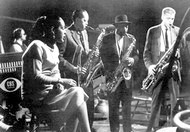 This was a TV broadcast show, a magic moment with an slightly different band from the rehearsal session above – and also with a poorer sound quality. Probably the most touching video from Billie – actually, one of the very few videos known. This was also her last session with her beloved friend Prez (Lester Young). Billie was probably finishing an interview when the track opens: “there’s two kinds of blues, the happy blues and the sad blues (…) everything that I do sing it’s part of my life…“
This was a TV broadcast show, a magic moment with an slightly different band from the rehearsal session above – and also with a poorer sound quality. Probably the most touching video from Billie – actually, one of the very few videos known. This was also her last session with her beloved friend Prez (Lester Young). Billie was probably finishing an interview when the track opens: “there’s two kinds of blues, the happy blues and the sad blues (…) everything that I do sing it’s part of my life…“
(LR 193) Fine And Mellow [8’00″] *** all of them are here, live: Ben Webster, Lester Young, Mal Waldron, Gerry Mulligan. In the first bridge, Ben Webster solos and Lester gives sequence. Billie, in close, has shining eyes and follows the rhythm wiggling her head. After the second chorus, it’s Eldridge turn to solo, somewhat nervous, maybe because of the cameras… he shows off a bit… Billie comes back for the final chorus: “treat me right baby…” – Unforgettable, and a rare video register that make us imagine that many sessions we lack images. And last, but not least, remember this is a Billie’s own composition.
Original LP ESP-3006 Broadcast Performances 1956-58 (US 1973). Sound not available.
![]() Billie Holiday “Fine and Mellow”
Billie Holiday “Fine and Mellow”
You can also find the video in the album “The ultimate collection- DVD film & TV performances” and the music in the box “Perfect Complete Collection vol.11” and also in the CD “Broadcast Performances vol. 3” (see discography).
© 2007-2017 www.billieholidaysongs.com – February 2017

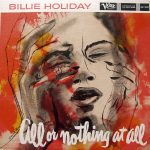
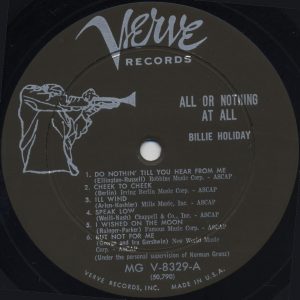
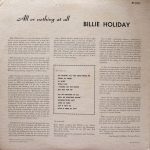
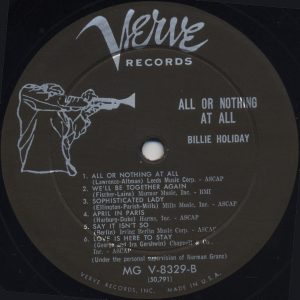
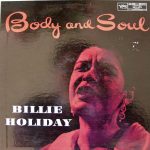
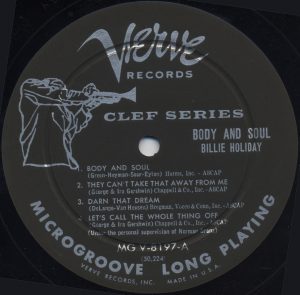
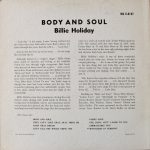
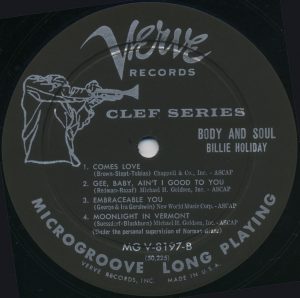

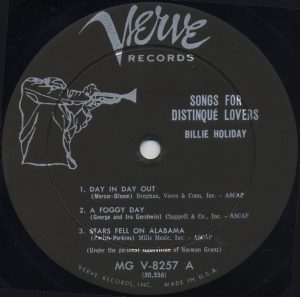
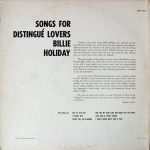
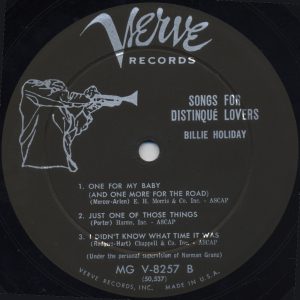
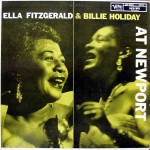
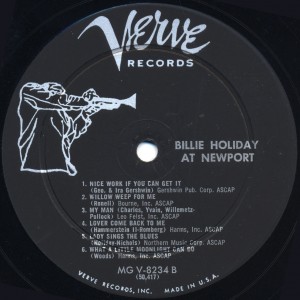
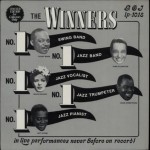
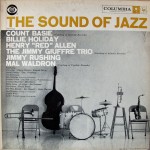
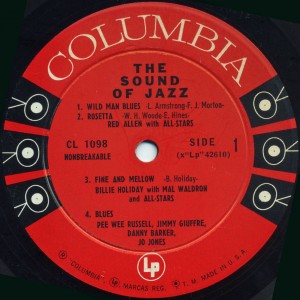
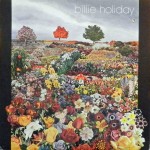
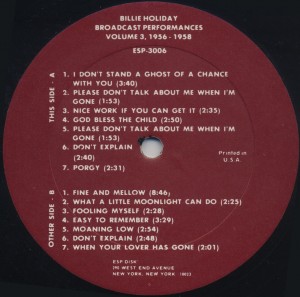
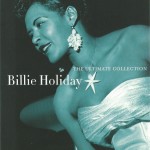
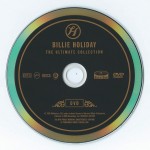
Dear Paulo,
I thought your observation on the (in my opinion, probable) influence of Holiday’s version of “One for My Baby” on Frank Sinatra’s later versions to be quite astute. Sinatra recorded two version of “One for My Baby” before 1957: one in 1947, with an orchestration by Axel Stordahl, and a second in 1954, for the movie “Young at Heart.” Both version are clunky and rather woodenly ill-fitted, as if the various musical phrases didn’t quite fit together–neither a unified aim nor a coherent development is present in either version. Holiday’s version was released in the autumn of 1957, on the original 8-track version of “Songs for Distingue Lovers.” By April of 1958, Sinatra’s next version of “One for My Baby” has completely changed, becoming coherent and emotionally resonant–and then, of course, he recorded this same super-charged version for “Only the Lonely” later that year. And–not, I think, coincidently–1958 was also the year Sinatra was quote as saying that Holiday was the single greatest influence on American popular singing for the previous twenty years.
Dear Joe,
I was missing you! Thanks for your comment, that I included in the Lyrics chapter.
All the best
Paulo
Can I find the vinyl of the webster/edison sessions anywhere?
tnx!!
Dear Gizzo
You may find these on some LPs issued by Verve, like “All or Nothing at All”, “Body and Soul” and “Songs for Distingué Lovers”.
If you go to the menu Discography>LP in my site, you can search for individual songs or records.
Good Luck.
Paulo
I would see August 1956 to January 1957 as her last great peak. Many of the greatest recordings of her career (or anyone’s career) occur in that spell. It’s a great shame that she couldn’t have done some more studio work in the first 6 months of 1957, while she still had the musicians and before she totally lost her voice.
One for my baby… and one more for the road hmmmm
Paulo
First, I thank you for the sustained effort that went into this very useful website. Maybe you can help in this regard:
The liner notes to Verve’s The History of the Real Billie Holiday 2-V6S 8816 seem to be badly inaccurate (as well as poorly organized). All but one of the tracks on Side 1 are credited to Mal Waldron, Joe Benjamin & Jo Jones & dated Carnegie Hall 1957. But I can’t find those Side 1 tracks listed in your 1957 sessions nor do I find a Carnegie Hall concert listed there either (in fact I can’t find it anywhere on the internet). Also, the Fine & Mellow track, for example, clearly has a clarinet & guitar, and therefore I suspect it actually comes from the 11/56 Carnegie Hall second session which involved Scott & Burrell, but not Waldron, Benjamin or Jones. Could you clarify the acutal month/year & performers for the 4 tracks in question?
You are right. From what you describe, these tracks are from November 1956 Carnegie Hall Concert.
You will find all data em the site, track by track, in the menu Sessions 1956, Live Session #51.
You may also hear them and compare.
And thanks for the compliments.
I have the Classic records CD of Songs For Distingue Lovers.All the tracks are the stereo versions,seems to be the only place you can here them.Thanks for a very interesting website. Paul
Dear Paul,
I don´t actually have “Songs for Distingue Lovers” in CD (but I happen to have the original LP, also in stereo! – wonderful). The reason is, Paul, because all the songs are contained in the marvelous 6-disc Verve box. On my “CD discography” menu, i decided to select a small set of CDs that contain ALL the songs. So, if you follow my discography, you will have all studio and life tracks she ever recorded. That´s why the CD you refer to is not among them.
However, if you go to 1957 recording sessions you will find all the songs (and they all are marked ‘stereo’.
Hope this will help you. Stay in touch.
Further to my query about the stereo Songs For Distingue Lovers album.I have recently seen in a charity shop in England a Billie Holiday album on Music For Pleasure a budget EMI label issued in 1971 titled One For My Baby and One More For The Road.It contained 10 tracks 6 from Distingue Lovers and 4 more from the same sessions.It was marked as stereo,so it would be interesting to see if the extra tracks were in fake stereo or mono.I don’t own a record player, so i didn’t buy it.I have seen copies for sale today on British Amazon.Cheers Paul.
Hi Paul, welcome back. A short answer would be that only the 6 tracks from Distingue are stereo. The other 4 are originaly mono. Regs Paulo
I do not understand how anyone can say that Lady completely lost her voice . I do not agree. Her two live performances from 1958 at the Plaza and in Connecticut show her voice at It’s most beautiful. She was also in much better voice and gave a superior set in Stratford as compared to her ’57 Newport performance.
And how about 1958′ session in the Plaza Hotel?